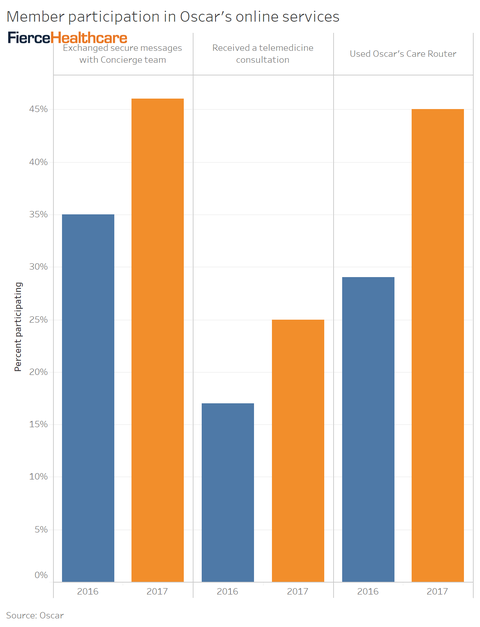Oscar Health saw a 32% increase in telemedicine consultations among its members last year amid an overall increase in virtual services.
Telemedicine consults are less utilized than the other digital services offered by the company: 25% of members used the service in 2017, up from 17% in 2016. But those figures outpace other telemedicine leaders. A survey published last year by the National Business Group on Health found that nearly 20% of employers have telehealth utilization rates of 20% or higher.
Oscar’s telehealth utilization rates outpace those of industry leaders as well. Teladoc recently reported a 7% utilization rate among its 23 million members in 2017.
Broadly, members have gravitated to the insurance startup's suite of virtual services, which are foundational to the company's approach to patient care. Last year, two-thirds of member interactions were conducted virtually, according to an announcement emailed to FierceHealthcare.
Most of those interactions were traced back to secure messaging with Oscar’s Concierge team (46%) or the insurer’s “Care Router” (45%), which helps members find physicians and book appointments online or through a mobile app.

Use of Oscar’s Care Router saw the biggest year-over-year increase, but the insurer is focused on ensuring all of its virtual services work together seamlessly, according to Liz Robau, Oscar’s product and technology communications manager. If a member searches for a provider to treat a skin condition, for example, they are offered an option to request a telemedicine appointment. Data from that virtual visit—which is free for all members—is then available to Oscar’s Concierge teams and Oscar providers. Each service is available on Oscar Health’s mobile app, so members aren’t forced to open up multiple applications.
“It ends up becoming a positive feedback loop the more Oscar members engage with us,” she says.
RELATED: Oscar, Cleveland Clinic use FHIR to streamline data exchange
Moving forward, Oscar plans to integrate some of those features into its provider partnerships, including a new initiative with the Cleveland Clinic that uses Fast Healthcare Interoperability Resources (FHIR) to share data. Last year, the company launched a Clinical Dashboard that uses analytics to contextualize patient data for physicians.
But Oscar has also struggled to pull itself out of the red financially. After posting a $204.9 million loss in 2016, the company lost $57.6 million through the first half of 2017. CEO Mario Schossler predicted 2017 would mark a financial turnaround for the company.